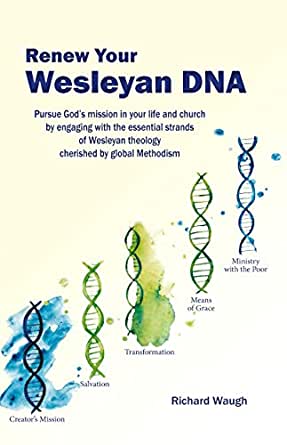If you’ve been part of a marching band, you know how intricate the planning is for halftime. I spent the last 16 years in Ohio, where it’s impossible not to hear regularly about Ohio State University. Renowned for its sports teams, OSU is also known for its marching band and its creative halftime shows. One halftime show particularly caught my eye: a tribute to Michael Jackson, in which the band took his shape and proceeded to moonwalk across the field. It was amazing! In a marching band, one individual part may look like random steps, but when put together with all the other parts, the band works together to create an amazing picture. And as the apostle Paul finishes his letter to the Ephesians, he acts like a marching band director choreographing the halftime show. He gives instructions to the Church so that it can faithfully stand as a beacon of peace and righteousness. Today, we’re looking at three things that are necessary to remain standing after all is said and done: The body. The armor. The power.
Let’s read from Ephesians 6:10-20 (CEB):
“Finally, be strengthened by the Lord and his powerful strength. Put on God’s armor so that you can make a stand against the tricks of the devil. We aren’t fighting against human enemies but against rulers, authorities, forces of cosmic darkness, and spiritual powers of evil in the heavens. Therefore, pick up the full armor of God so that you can stand your ground on the evil day and after you have done everything possible to still stand. So stand with the belt of truth around your waist, justice as your breastplate, and put shoes on your feet so that you are ready to spread the good news of peace. Above all, carry the shield of faith so that you can extinguish the flaming arrows of the evil one. Take the helmet of salvation and the sword of the Spirit, which is God’s word.
Offer prayers and petitions in the Spirit all the time. Stay alert by hanging in there and praying for all believers. As for me, pray that when I open my mouth, I’ll get a message that confidently makes this secret plan of the gospel known. I’m an ambassador in chains for the sake of the gospel. Pray so that the Lord will give me the confidence to say what I have to say.”
Before we get into specifics, let’s look at the overall context of Paul’s letter: Paul writes this to remind the Ephesians of their identity in Christ, their unity as the body of believers—regardless of ethnic or other differences—and to encourage them to live in a way that honors God. The content of the book is split in half: the first three chapters explore the blessings of our life in Christ and how we have been saved by grace through faith; the last three chapters describe how we live as a result of our new life in Christ. After all, when something amazing happens in your life, you live differently.
Before jumping to Ephesians 6, let’s recognize an important aspect of this letter. We often read letters like this, hear the author say “you,” and assume it refers to me as an individual. While it’s true that as an individual believer, I need to follow Scripture, this is not Paul’s primary emphasis. Most of the time, Paul uses the plural form of “you” (“all y’all,” as we say in Kentucky) to address the Ephesians. In other words, these are commands for the church as a whole. God is calling the church to work together and help one another to live faithfully as believers.
As we venture into 6:10, Paul begins to wrap up. He urges the Ephesians to be strong in the Lord’s great strength. This is not a new theme in the book. Paul goes full circle—in 1:19, Paul told the Ephesians that he prays they may know “the immeasurable greatness of [God’s] power for us who believe, according to the working of his great power.” This is an important reminder—especially for the discussion about evil powers that comes next. We do not rely on our own strength.
Having the correct source of power is incredibly important: If you have a fancy sports car, you’re going to use the best gasoline available. You can’t just pour water in the tank. And if we’re going to have strength for the battle ahead, we have to rely on the right source of power: God’s power, not our own. Paul is emphatic about this: he repeats the idea of strength three times in a single verse: literally, “strengthen yourselves in the power of his strength.” We need God’s power, not our own, because the battle ahead is a difficult one.
In verses 11-12, Paul calls believers to put on the armor of God, because it is the only way to withstand the evil day. He makes it very clear that we are not simply battling everyday circumstances and temptations; rather, powerful forces exist that in the world that make every effort to derail our walk with God.Paul describes them as rulers, authorities (not government authorities!), cosmic powers, and spiritual forces of evil in the heavenly places. There is a spiritual realm populated by hostile forces that are in opposition to the work of God. Paul’s point here is not to catalog the various kinds of demonic forces. Rather, he emphasizes the spiritual component to the struggles we face.
Yet Paul notes that these spiritual powers are in “the heavenly places.” The Ephesians who have read this letter will recall:
- 1:3: We have been blessed in Christ “with every spiritual blessing in the heavenly places.”
- 1:20-21: Christ sits at the right hand of God in the heavenly places “far above all rule and authority and power and dominion, and above every name that is named, not only in this age but also in the age to come.”
- 2:6: We are seated with Christ in the heavenly places.
- 3:10: The plan of the mystery of God has been revealed so that through the Church the wisdom of God will be made known to the authorities in the heavenly places.
Paul is urging us to be prepared to fight these forces but not to be afraid. Everything Paul has written to this point in the letter reminds us that Christ’s power is far greater than their power, and we who believe are seated with Christ, far above these lesser powers! Our transformed lives and unity in the body of Christ serve as testimonies to these spiritual beings, that God already has won the victory through Christ.
After digressing to point out who we are fighting (and the ultimate defeat of these spiritual forces), in verses 13-17 Paul returns to call the Ephesians to put on the whole armor of God. Traditionally, these next few verses are read as a call to the individual believer to put on the armor of God, but Paul already told us earlier in the letter who is the body that wears the armor: “And [God] put all things under [Christ’s] feet and gave him as head over all things to the church, which is his body, the fullness of him who fills all in all” (Ephesians 1:22-23).
This armor is effective when the whole body takes it up—there is a communal sense. We are not meant to be solitary individuals bearing the armor of God; rather, we are meant to help one another to bear the armor. Like the OSU marching band, in which individuals walk a path laid out for them and together make a unified whole, we who believe work together to provide a unified vision of the life in Christ.
What is this armor? Paul uses military imagery to illustrate preparing for battle, and yet the armor described is used mostly for defense. It is the devil who wages war on us, and our job is to stand our ground, stand firm, and remain standing. We’ve had a lot of hurricanes this season, and I’m always amazed at the weather reporters who stand out in the middle of the storm: they have a job to do and they find a way to stand firm in 70 mile an hour winds.
That’s our job as believers: we don’t go out looking for the battle; we know it will come to us. But New Testament scholar Andrew Lincoln reminds us: “The decisive victory has already been won by God in Christ, and the task of believers is not to win but to stand, that is, to preserve and maintain what has been won.”
Yet we won’t always face a hurricane. Scripture refers to the “schemes” of the devil. Sometimes attacks are powerful because they are subtle, taking us by surprise. Rather than a hurricane, we face a creeping mist that slowly blinds us, leaving us groping in the fog. Whether we face an onslaught of terrible life circumstances or creeping doubt, we have to be prepared to stand firm.
The first two pieces of armor that help us to stand firm are the belt of truth and the breastplate of justice (also translated righteousness). In terms of Roman armor, which is what Paul’s readers would picture, the belt is likely a reference to the leather aprons worn under the armor. This allowed freedom of movement while protecting the thighs. The metal breastplate protects a soldier’s vital organs, such as heart and lungs. When Paul refers to the belt of truth, “truth” has the sense of faithfulness and loyalty to God, and the breastplate of justice (or righteousness) has the nuance of doing what is just or right. We may think of being righteous, but the terminology refers to an action!
Paul does not pull this imagery out of thin air; these pieces of armor are mentioned by the prophet Isaiah. In one case, a messianic figure brings righteousness and faithfulness to those who suffer, particularly the poor (Isa. 11:4-5). In another case, God is offended at the lack of justice in the land, so God himself brings righteousness and justice to the people (Isa 59:15-17). Paul uses this imagery to describe how the church, the body of Christ (you and me!) must wear that same armor in order to fight its battles. The warrior God is a God who cares about righteousness in the land—justice for the poor and oppressed. When we wear God’s armor, we are to demonstrate God’s justice and righteousness.
Paul already said this in a different way in Ephesians 4:24 when he called them, “to clothe yourselves with the new self, created according to the likeness of God in true righteousness and holiness.” Here in our worship space we see the phrase “holiness to the Lord” displayed prominently. It reminds us that we are called to be people set apart for the Lord; we imitate Christ and offer every aspect of our lives to the Lord. We seek holiness in our own lives, and we work in the midst of culture to transform the injustices that we witness around us.
Connected to this righteousness is the imagery of shoes that prepare one to proclaim the Gospel of peace. Paul already wrote about the Gospel that brings peace, declaring in 2:14-16 that Christ is our peace, who destroyed the wall of hostility—the ethnic rivalry—between Jew and Gentile, making all believers one in Christ. And Isaiah connects righteousness with peace in 32:17:
“And the effect of righteousness will be peace, and the result of righteousness, quietness and trust forever.”
When Christians are faithful to God, when we live rightly—in a way that brings about justice to the community—this brings peace. It is common to hear protestors chanting, “No justice, no peace.” This was not an idea created in the 1960s; these protestors cite a biblical theme. It is only when justice pervades the land that peace will exist among us. We must work for justice for those who have been wronged—whether demanding justice for Breonna Taylor, providing aid to the poor in our community who have been overlooked, arguing for the rights of those with disabilities, or protecting others in society.
Next, Paul calls believers to take up the shield of faith to extinguish the flaming arrows of the evil one. Roman shields measured about 4’ x 2-1/2’ and were made from wood covered in leather. Paul identifies the shield for Christians as faith. When we trust the message of the Gospel, when we believe that Christ died for our sins, when we know that the Holy Spirit is transforming our lives, then these beliefs extinguish the lies of the devil, when he tries to tell us we’re not worthy, we’re irredeemable, we can never change.
But there’s more to this imagery than standing firm in our faith! Roman soldiers worked together in formation. They brought their shields together in battle so that they could protect one another from literal flaming arrows. This testudo formation (“tortoise” in Latin) created a shield wall—soldiers in the front line held their shields forward; those in the middle held the shields overhead, and those on the sides protected from the sides. Soldiers were far better protected when they worked together.
This underscores the “all y’all” language. Paul encourages us to work together as the body of Christ. It’s the body of Christ together that wears the armor. John Wesley proclaimed that he knew no holiness but social holiness—by which he meant that the body of Christ works together to strengthen each other.
We cannot stand alone in this battle to keep our faith alive and vital. If you help me to strengthen my faith, and I help you to strengthen your faith, then together we are better prepared to withstand the flaming arrows of the devil. We need each other. We are stronger when we are unified.
But our armor is not yet complete. Paul keeps telling us we need the whole armor of God, and armor is incomplete without a helmet and a sword. For the believer, this is the helmet of salvation. Protection comes from knowing that Christ has already won the battle on our behalf. The only offensive weapon for the soldier is the sword of the Spirit, the word of God. The term for sword refers to a short sword (about two feet long) that soldiers used for combat in close quarters, where fighting was particularly brutal. The Spirit is the power that makes the sword effective. The “word of God” refers to the gospel message of Christ, laid out for us in Scripture. This sword makes sense as a weapon: when the devil attacks, scheming and lying, the believer’s best counterattack is claiming the truths of the Gospel found in Scripture. Paul gives plenty of these throughout Ephesians:
- God chose us in Christ (1:4)!
- God destined us to become adopted as his children (1:5)!
- We have redemption through the blood of Christ (1:7)!
- God loves us (2:4)!
- God saved us (2:5)!
- God created us for good works (2:10)!
- God has reconciled us to one another (2:16)!
- We have access to the Father through the Spirit (2:18)!
- We are being built into a dwelling place for God (2:22)!
And that’s just the first two chapters. We need to be immersed in the truth of the love of God so that we can stand firm. But Paul is not done yet. Although his armor language ends with the sword of the Spirit, he urges believers to cover the battle in prayer. He started with the command to be strong in the Lord and the strength of his might. But how do we find strength in the Lord? We connect to God, submitting ourselves to God’s will, through prayer.
Paul refers to the kind of prayer in which we talk to God and listen to God throughout the day. The way that we keep alert in battle is to be in prayer regularly. This is how we stand firm in the power of God’s mighty strength.
Just like our armor must be worn together, our prayers are offered for each other. Paul begins his letter by praying for the Ephesians, and he ends by asking the Ephesians to pray for all the saints, including Paul himself, who is under arrest for preaching the Gospel. The body that wears God’s armor finds its strength only when it is connected to God whose mighty strength has made the victory possible.
Paul concludes by urging the Ephesians to stand strong. He gives us three keys to remain standing: The body. The armor. The power.
Without the body working together to strengthen each other, gaps in the armor appear; flaming arrows slip through, wreaking havoc. This Christian walk was never meant to be solitary. We encourage each other, building each other up. When you join a church, you learn from small children, middle-aged parents, and elderly saints. You get to speak into their lives and encourage their walk with Christ. Becoming part of committed discipleship groups helps us grow in the faith. John Wesley’s vision of banded discipleship groups recognizes the importance of the body strengthening each other.
To stand strong, we need (say it with me!) the body, the armor, and the power. Without the armor of truth, justice, peace, faith, salvation, and the Spirit-empowered Gospel message, we are susceptible to the lies of the devil, who tells us we’re not loved, we have no value, we have no future. When we live faithfully in God’s truth, when we trust the love of Christ and devote our lives to him, we find that God’s armor holds fast. In wearing God’s armor, we pursue justice in an unjust world, we love and care for the humanity that God fought so hard to save, and we bring light to dark places.
To stand strong, we need the body, the armor, and the power. Without the power of God’s mighty strength, none of us will be able to stand in the evil day. It’s that simple. None of this happens on our own. Regular prayer, individually and together as the body of Christ, connects us to God, whose power is more than enough for the battle we face. Together as the body of Christ, we must seek God’s power to transform the world. To withstand the evil day and to remain standing, we need the body, the armor, and the power. This is Paul’s call to the Ephesians, and it’s God’s call to us today.










